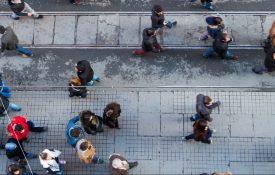-

Other People Are Less Attention-Grabbing to the Wealthy
The degree to which other people divert your attention may depend on your social class, according to findings published in Psychological Science, a journal of the Association for Psychological Science. The research shows that people Visit Page
-
‘Brain-training’ games train you in only one thing: Playing brain-training games
The Washington Post: Spend enough time playing "brain-training" games, and you'll get pretty good at games. But you won't necessarily get better at anything else. That's the conclusion of an extensive review published in the journal Psychological Science in the Public Interest this week. A team of psychologists scoured the scientific literature for studies held up by brain-training proponents as evidence that the technique works — and found the research wanting.
-
How the Stress of Racism Affects Learning
The Atlantic: A recent study from Northwestern University corroborates Agostini’s experience, suggesting that the stress of racial discrimination may partly explain the persistent gaps in academic performance between some nonwhite students, mainly black and Latino youth, and their white counterparts. The team of researchers found that the physiological response to race-based stressors—be it perceived racial prejudice, or the drive to outperform negative stereotypes—leads the body to pump out more stress hormones in adolescents from traditionally marginalized groups.
-
Looking down on the people
The Boston Globe: BEING AFFLUENT MEANS you don’t have to rely on others so much. So why look at them in the first place? Psychologists at New York University found that social class is associated with what people pay attention to, and for how long. In one experiment, pedestrians in New York City were asked to don a pair of Google Glass glasses, which recorded what the pedestrians looked at as they walked down the street for a minute. Read the whole story: The Boston Globe
-
Teens’ Penchant For Risk-Taking May Help Them Learn Faster
NPR: The teenage brain has been characterized as a risk-taking machine, looking for quick rewards and thrills instead of acting responsibly. But these behaviors could actually make teens better than adults at certain kinds of learning. "In neuroscience, we tend to think that if healthy brains act in a certain way, there should be a reason for it," says Juliet Davidow, a postdoctoral researcher at Harvard University in the Affective Neuroscience and Development Lab and the lead author of the study, which was published Wednesday in the journal Neuron. ...
-
The Chicago Cubs, the Goat Curse and the Psychological Roots of Superstition
Scientific American: It is, of course, scientifically impossible for the legendary Curse of the Billy Goat—which dictates that the Chicago Cubs will never win the World Series—to affect the outcome of games in the 2016 postseason. To give credence to the curse (laid on the team in October 1945 by an angry bar owner whose smelly mascot goat was evicted from Wrigley Field) is irrational and the very definition of magical thinking. And yet, as the Cubs once again seek to end their 108-year World Series Championship drought, lifelong fans like Michael Pardys struggle—and fail—to remain rational. Read the whole story: Scientific American

